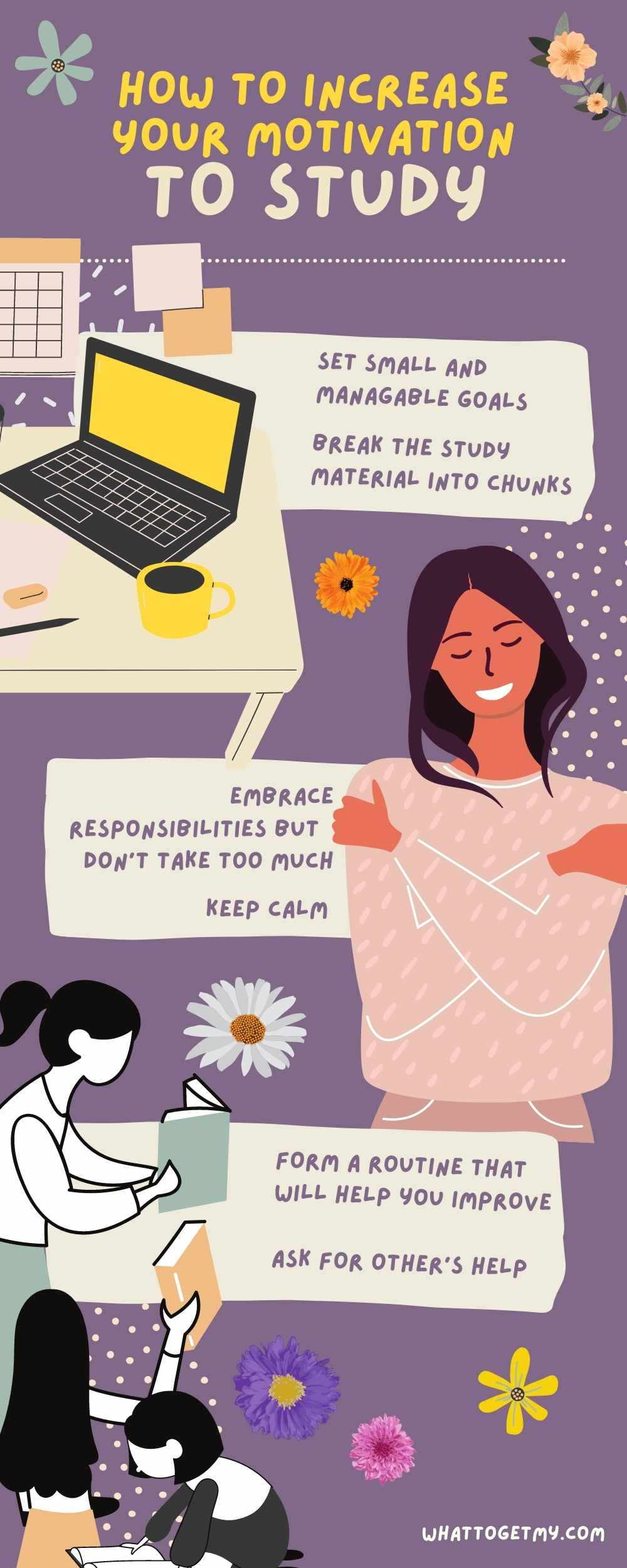How to Get Motivated to Study When You’re Depressed?
WhatToGetMy Instructional Article
Depression is a serious illness that causes a persistent feeling of sadness and loss of interest. If you think you’re depressed you should talk to a therapist because that’s the best way to get adequate help. However, sometimes people say depressed when they think sad and unmotivated, so we’re going to imply that meaning in this article.
You know the period when you’re feeling down and experience a depressive episode. The main problem is that you need to handle tasks and responsibilities when you think you can’t do anything at all. We’ll try to help you learn how to get motivated to study when you’re depressed by giving you some strategies that a lot of people find effective.
As we said, if you think you’re depressed and that your mood is not just a passing phase, you might need professional help. The most common symptoms of depression are:
- Low interest in activities that you used to find enjoyable
- Insomnia or increased need for sleep
- Lack of appetite or an increased appetite which leads to either weight loss or gain
- Restlessness or lack of energy
- Trouble with concentration
- Low self-esteem and poor self-image
- Suicidal thoughts

Source Link: https://whattogetmy.com/how-to-get-motivated-to-study-when-depressed/
Sadness and motivation
Table of Contents
Lack of motivation is a more common problem than you think. A lot of young people don’t have the will to finish tasks. They’re struggling with self-confidence and fear of failure. The intensity of motivation varies from time to time. However, some strategies help you boost the level of motivation even though you’re constantly sad.
It might seem hard in the beginning, but we assure you it gets easier. Persistence feeds the motivation and it grows over time. Getting motivated is an overwhelming task but not an impossible one.
Set small, manageable goals
If you set your mind on a huge amount of homework and endless exams, it will seem impossible to finish. To avoid being overwhelmed by that workload, you need to set small goals you can finish. The best way how to increase motivation when you’re depressed is succeeding in something. When you meet small manageable goals, you’ll boost your confidence. This leads to increased motivation and you can start adding more goals until you’re done with exams.
Set the bar low
When you’re depressed you’re not giving a hundred percent in commitment to daily tasks. If you’re not giving your maximum, don’t expect that you can achieve impossible. Don’t set the same expectations for yourself like you had before. Set small and specific goals that you consider achievable. You can always raise the bar when you feel a bit better, but for now, focus on tackling manageable goals.
Here are some suggestions:
Get up and make the bed.
Getting out of bed is the first (and the biggest) victory of the day. Yes, you can do it! Leave notes the previous day to remind yourself that you can actually do this. Every journey starts with one step and you getting up is that one step. Don’t give yourself time to dwell, get up, and make the bed without thinking. If you reach for the phone, you’re more likely to stay in bed for longer. You want to avoid this, so make the bed.
Get dressed.
All you should strive for in the morning is getting out of pajamas. You can wear something comfortable but the act of changing the clothes you sleep in is inspiring. Getting dressed and looking decent will give you a mental boost to face the day in front of you.
Go for a walk
You might not be able to exercise or start morning jogs but you can go for a simple walk. When you’re exercising, your body releases endorphins. Although you can’t work out for an hour, you will still feel better after a small walk. After achieving this goal a couple of times, you can reach for more.
Break the study material into chunks
This is in correlation with the previous advice. You need a sense of achievement to feel more motivated to continue with tasks. The best way to do this is to break each exam into smaller chunks. Assign yourself a certain number of those pieces each day. After some time, you won’t have an impossible exam in front of you, because you’ll cover almost half of the study material.
A chunk can be reading ten pages of your textbook, completing five questions, or anything else you feel comfortable doing. Divide the study material, so you can cover the important bits without pressure. Don’t try to read everything. Skip the recommended additional literature and stick with essentials.
Changed point of view
A good mental practice is changing the questions you ask yourself. Instead of worrying “How can I ever pass this exam” you can ask “How much of the material can I cover in one hour”. When your mindset focuses on manageable goals you’re more likely to succeed.
Encouragement and self-compassion
Studying while depressed is hard, so give yourself more credit. Don’t berate yourself for not completing one task. Instead compliment yourself for the things you’ve done such as getting out of the bed, brushing your teeth, etc.
Fight negative thoughts about your capabilities with positive thinking. Say something positive about yourself in front of the mirror. Even if you don’t mean it at the moment, say it anyway. Or write it, if it’s easier. The positive and negative thoughts will create a neutral state of mind. Over time, the bad, the unused thoughts will fade away. You’ll start to believe those positive statements you keep repeating. They are true, you are worth it!
Have more compassion towards yourself. Understand that it’s okay to be “lazy” and “unproductive”. Don’t blame yourself for procrastinating. Only after you get rid of the guilt, you can make some progress.
Reward yourself for the good things you’ve done and don’t contemplate the bad ones. If you tacked one chunk of material, let yourself relax before you start another. Watch some videos, play games, etc. Acknowledge that you’ve managed to finish something. That’s an accomplishment and should be celebrated as such.
Embrace responsibilities but don’t take too much
As we said, tackling huge goals might seem overwhelming. Don’t set yourself up to fail by telling yourself you’ll do more than you can. However, avoiding work won’t help your motivation either. You need to find that tricky balance between too much and too little.
Making daily schedules can help you with this. You can take a step back and try to objectively observe what you can accomplish in your current state of mind. If you can only manage one task today, that’s fine. As we said, achieving small goals will improve your confidence and increase motivation. Tomorrow you’ll be able to do two tasks.
Form a routine
If you manage to get out of bed, brush your teeth, and go for a walk, start doing that every day. After a while, this will be a part of your daily routine. This might not help you to learn how to stop being depressed and get motivated because you already know that things are not that simple.
However, you’ll be surprised how much having a routine helps you feel good about yourself. You’re doing something and you’re doing it every day. The motivation will gradually grow and soon you’ll be able to do something more. Incorporate every positive activity into your routine.
Although having daily plans isn’t for everyone, routines help a lot of people to just keep going. Write down your plan and stick it to a wall. Make checklists, so you can feel good when marking completed tasks. Not only will this bring you a sense of accomplishment for previously finished tasks but it will inspire you to tackle new ones.
You can also keep a journal as a part of your routine. Journals can be a place to store your negative thoughts, so you can make a space in your life for positive reinforcement. Write about what you feel and envision how you could feel. Compare the emotions of sleeping late and refusing to get out of bed, and getting up, making the bed, and having a study session. Is there any difference? How can you nurture positive actions and emotions?
When you’re trying to plan a study routine, ask yourself what tasks need to be done and what can you do right now. Take a time-limited approach: study for half an hour (or more if you can) and take a 15-minute break. This way you won’t feel like being forced because you’ll have a lot of free time. You’ll even learn better in short bursts because you’ll be more concentrated.
Habits, of course, don’t form overnight. Take into account that a lot of time will pass before your efforts pay off. Don’t let this fact discourage you.
Ask your friends for help
If you want to know how to be motivated to study, you can ask your friends for their advice. They might not have the same problems as you, but they’ve surely tried various strategies to stay motivated.
You can also try studying in groups. It seems overwhelming, but it can be very helpful. If you surround yourself with hardworking people, you might be more encouraged to study. When people study in groups, they make commitments to each other. Then it gets easier to break bad habits such as procrastination.
Also, studying in groups points to the simple fact that everyone has different strengths and weaknesses. If there’s a subject you’re not good at, chances are high that someone in your group can help you. Vise versa, you can explain certain topics to your friends.
Having a support network is very important in difficult situations, so don’t be afraid to ask for help. Choose the people you trust and feel comfortable with. You don’t have to share all of your feelings but it feels nice to vent when you’re feeling overwhelmed.
Understand your studying style
To learn how to study when you’re depressed, you need to remember how you studied before. What methods did make your study sessions easier? How did you make topics more interesting? Did you use flashcards or watched educational videos? People study differently and everyone has a unique “studying style”. Reflect on your style and see what works for you.
Some people try to summarise the information they receive. They achieve this with flashcards, bullet points, and writing summaries of each chapter of the textbooks. Other, more visual people, are remembering study materials by using pictures. They use colors to underline the important things, draw diagrams and schemes in notebooks, watch videos, etc.
Auditable types of people listen to podcasts and lectures about the subject they’re studying. Spending 20 minutes listening to somebody breaking the topic into simple terms can be more helpful for someone than sitting in front of the textbook for 2-3 hours. All of these approaches are viable. It only matters what can help you.
The point of studying is understanding the subject, not just memorizing facts. If you can understand it, the chances are you won’t be able to learn anything. The internet is full of inspiring people who want to explain their expertise. Check the internet for resources, if your textbooks are not enough for you to completely understand the topic.
Other useful study tips
- Get rid of distractions. Once you actually start studying it can be easy to stop and check your social media feed “just for a second”. The safest option is to put your phone in a different room, so you won’t be tempted.
- Keep snacks nearby and drink plenty of water. Peanuts, almonds, and fresh fruits are the best food choice for study sessions. You’ll be energized and refreshed.
- Listen to soothing music if you find silence terrifying like we do. There are a lot of playlists made just for studying, from jazz to fantasy music.
Conclusion
Remember that a lot of people struggle with the ways how to get motivated when depressed. You are not alone. Take one step at the time and you can succeed. It’s not easy but it’s not impossible.
Teachers also try to motivate their students the best they can. There are a lot of motivational activities out there, so maybe you can check them out too.
01 HOUR 29 MINUTES
ESTIMATED TIME DESIGNING AND UPLOADING THIS ARTICLE
07 HOURS 28 MINUTES
ESTIMATED TIME RESEARCHING AND WRITING THIS ARTICLE
You Might Also Like

11 Effects of Living with an Alcoholic Spouse and How to Live with an Alcoholic Spouse.
11 Effects of Living with an Alcoholic Spouse and How to Live with an Alcoholic Spouse. WhatToGetMy Instructional Article Living with an alcoholic husband/wife can be a nightmare for the spouse who is not an alcoholic. It is a rollercoaster of emotions filled mostly with

How to Get Motivated to Study When You’re Depressed?
How to Get Motivated to Study When You’re Depressed? WhatToGetMy Instructional Article Depression is a serious illness that causes a persistent feeling of sadness and loss of interest. If you think you’re depressed you should talk to a therapist because that’s the best way to

12 SIGNS THAT YOU ARE INSECURE ABOUT YOUR BODY
12 SIGNS THAT YOU ARE INSECURE ABOUT YOUR BODY WhatToGetMy Instructional Article Do you ever feel self-conscious or insecure in your own body? Do you ever wonder if you could change something about your physical appearance? Growing up in a home where love was conditional,

How to Know if Your Teenager is Depressed and How to Help Depressed Teens
How to Know if Your Teenager is Depressed WhatToGetMy Instructional Article Find out all you need to know about teenage depression, the signs and symptoms of teenage depression, and how to help teens with depression. In case you missed it, read our two other helpful

11 Signs that Alcohol Is Killing You
11 Signs that Alcohol Is Killing You WhatToGetMy Instructional Article Every year it is estimated that alcohol contributes to the deaths of over 3 million people with men being more affected than women. Whilst some of this death is instantaneous such as with car accidents

Why Is It Important to Look at Things from a Different Perspective: 5 Vital Reasons.
Why Is It Important to Look at Things from a Different Perspective: 5 Vital Reasons. WhatToGetMy Instructional Article If you’ve watched the movie irobot, 2004, you’ll probably remember the scene where Detective Spooner chased down a robot that was running with a handbag. To the



